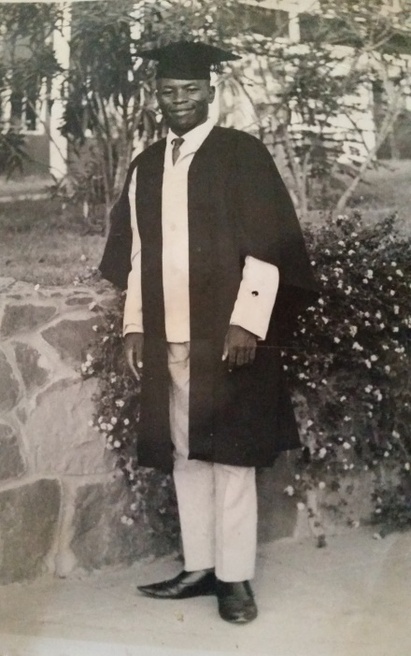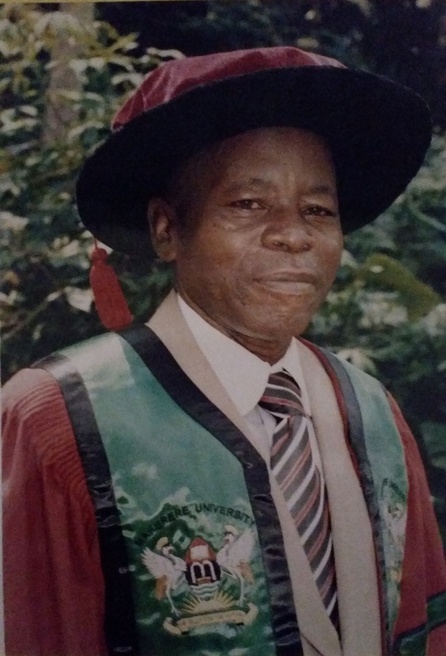Biography
Martin E. Amin was born on the 1st of March 1946 in Fontem to Late Pa Simon Aminde, and Mama Cecilia Atabongafac. In his early age his parents decided to migrate to Muyuka in order to take advantage of education for their children. He attended St. Peter Claver's Primary School Muyuka, in the then Southern Cameroon from 1952 to 1959. Upon completion he was lucky to be enrolled into St. Joseph’s College Sasse in 1960, since there were only 2 secondary schools for boys in English speaking Cameroon (Sasse College, and Bali College).
In 1964 after completing the Ordinary Level in Sasse College with exemplary results, he was retained in Sasse College to teach mathematics to Form 1 and Form 2 Students for one year.
In 1966 he was admitted into the University of Cape Coast in Ghana, where he studied for a Bachelor of Science with concentration in Mathematics and Physics and minor in Education. Being the best all round Science student, he was awarded a scholarship by the Cameroon Government for the rest of his studies in Ghana. In 1969 he graduated from the University of Cape Coast with a Bachelor of Science with a minor in Education.
After finishing his bachelor’s degree in Ghana, he decided to come back to Cameroon, and quickly got employment at the ministry of Education as a Mathematics teacher. He was posted to College Bilingue d’Application (CBA), Yaounde in 1969 and he taught there for 1 year. The following year, he was posted to Cameroon College of Arts Science and Technology (CCAST) Bambili in the North West Region, where he taught for 2 years (1970 - 1972).
In 1972 while teaching in Bambili, he married his wife, Stella Ngemfua Ekokobe who at the time had just completed the ordinary levels. In order to save money for further studies, they decided to have a very small wedding with only the Best Man and the Maid of Honor present at the wedding. The court wedding took place at Tube District in Bambili, and the church wedding was in Bambui.
Two months after his wedding he had to leave for Ottawa, Canada to continue his education for a Master’s Degree in Mathematics at the University of Ottawa. On admission into the University of Ottawa, he was also awarded a Tutorial Assistant (TA) position, which helped in paying for part of his fees. He did a lot of odd jobs to make ends meet. He worked as a Janitor, Security Guard and Taxi driver among other jobs.
In 1973 his wife joined him in Canada, and they welcomed their first son, Franklin Aminde, named after his Father. While his wife Stella studied for her Bachelors and Masters at Carleton University, he went on to finish his Master’s degree in Mathematics from the University of Ottawa in 1974 and subsequently his PhD in Educational Statistics, Measurement and Evaluation from the University of Ottawa in 1978.
In 1976, he and his family welcomed their second son, Edmund Acha-Ayi, named after his wife’s Father. With the pressures of family hood and the drive to return home, they decided to move back to Cameroon in 1978. Upon returning home to Cameroon, he was posted as a Lecturer to the University of Yaounde 1 where he began as a Statistical Consultant and Computer Data Analyst on the project “Sociolinguistic Survey of Urban Centres in Cameroon” 1979-1980. This Project was sponsored by Ford Foundation, USAID and University of Yaounde. In 1980 he was appointed as Director for the Workshop on Computer Data Processing techniques for the Social Sciences, a project also sponsored by Ford Foundation, USAID and University of Yaounde. He was also a Statistical and Computer Consultant on the USAID project on Infant Nutritional Practices in North Cameroon from 1983 to 1985.
In 1979 he and his family welcomed their third son, Atabongafac Marvin, who was named after his Mother. At this time he was also being trained by the University of London School Exams Department as a Systems Analyst and Computer Programmer for the Cameroon General Certificate of Education (GCE) Examinations. With this training, he directed the GCE from 1980 to 1983. He also worked as a Statistical and Computer Consultant on the WHO project on “The Socio-economic Aspect of Human African Trypanosomiasis”. He continued as a consultant with the WHO-HRP Center from 1983 to 2002 providing the statistical base for most of the projects, guiding on the methodology, computer analysis of the data and organising workshops on computer data analysis, data management and strategies for soliciting funds for the projects. Some of these projects included “Trends of Abortion in Rural Areas of Cameroon” and “Méthodologie de la Recherche dans les Domaines des Sciences Humaines sur les maladies tropicales a l'intention des pays Francophone de l'Afrique (CUSS)”.
In 1982, he and his family welcomed their forth Son, Tazanu Kenneth and named him after his wife’s uncle, Dr. Tazanu. With the ever growing family, he decided with his wife to build the family house at Nsimeyong. He continued his consulting work for several projects at the institute of Human Sciences from 1984 to 1990. Also in 1982, the Lebang Cultural and Development organization (LECUDO) was formed, where he hapilly joined as a member. For several years he hosted LECUDO at his residence and in 1990 he was appointed the Secretary General of LECUDO. In 1993 he was elected the President General of Lecudo. During his tenature, helped in the creation of Lebialem Division. He has also shown philanthropic support in primary schools in Fontem subdivision in particular and many less privileged in general
In 1987, he and his family welcomed their fifth son, Nelson Afangtenah who was named after his wife’s Mother. In 1993 he was awarded a contract to work as a Computer & Research Consultant for AKINTOLA WILLIAMS & COMPANY (An Accounting Firm where uncle Paul Acha was the managing partner) in the Ministry of Scientific Research. The assignment was to conduct a Financial Audit of the Research Institutes of the Ministry. This lasted for one year and his duties included a systems study of the Institutes, recommending computerisable activities of the Institutes, together with recommendations on appropriate software. He was also promoted to the Chief of the Division of Planning and Development of the University of Yaounde 1.
From 1996 to 1997 he worked with the World Bank as the principal consultant on the study for the “Demand for Primary Education in Cameroon”. He was also Vice President, University of Yaounde I COMMISION on the Evaluation
of the University Reforms in Cameroon (1997) and Technical Director University of Yaounde I-Indiana University Project on the evaluation of FALSS of the University of Yaounde I (1997-1998).
From 1997 to 2002 he was the Executive Director of the Cameroon Educational Consultants (CEDUC). Duties included organising and developing the Research Consultancy, searching funds for projects developed by CEDUC, and publicising CEDUC through public relations. In the year 2000, he was the Commonwealth Expert in Measurement and Evaluation to the Caribbean Examinations Council (CXC) in Barbados, West Indies.
In 2002, he applied for a job opening that was advertised by the Commonwealth to teach statistics in Makerere University in Kampala, Uganda. After a rigorous screening process by the Commonwealth and the University of Makerere, he was offered the position of Commonwealth Professor of Educational Research, Measurement and Evaluation. From 2003 to 2004 he was a member of the Makerere University Senate Adhoc Committee on Evaluation. He was then made Head of Research, Measurement and Evaluation Unit of the East African Institute for Higher Education Studies and Development. In this role, he was in charge of coordinating research activities, building research capacity and developing research Proposals for the Institute in the areas of Higher Education in ICT, Governance of Institutions, Assessment and Evaluation of Teaching and Learning in Institutions of Higher Learning. While in Uganda, he also worked as a consultant with the African Development Bank (ADB) on “The Evaluation of the Pilot Experiment on the Reduction of Class Repetition in Cameroon Primary Schools” (2004). The study assessed inputs (teacher qualification, teaching materials and the school infrastructure), the processes (compensatory teaching and competency-based teaching) and their impact on Repetition and Promotion in Cameroon Primary schools.
During his lifetime he wrote about 24 publications mostly in areas of Assessment, Measurement and Evaluation, and published about 25 books which are listed below:
Social Science Research: Conception, Methodology and Analysis - published by Makerere University Press & Printery (2005) Foundations of Statistical Inference for Social Science Research - published by Makerere University Press & Printery (2004) Descriptive Statistics for the Social Sciences (2000) Trends in the Demand for Primary Education in Cameroon (1999) Primary Mathematics for Cameroon (1985) Pupil’s Book 1 to 7 Teacher’s Book 1 to 7 Pupils Workbook 1 to 7
In 2007, with the help of his children, he founded the Cameroon Bilingual Centre for Information Technology and Consultancy (CITEC), to be an institute that promotes IT Literacy and Awareness, thus alleviating poverty as well as fostering development in areas. In 2007 CITEC was accredited by the Ministry of Employment and Vocational Training for Professional Diplomas. In 2008 CITEC partnered with CISCO and become a CISCO Certified Academy, offering certifications in CCNA, CCNP and more. In 2010, CITEC was accredited by the Ministry of Higher Education and Vocational Training to provide Higher National Diplomas and Higher Professional Diplomas and became CITEC Higher Institute of Technology and Management. In 2013, CITEC was accredited by the University of Bamenda and visa’d by the Ministry of Higher Education to offer Degree programs with University Degrees awarded by the University of Bamenda. From 2007-2015 he continued his work as Director of CITEC.
In 2012, he was inducted as a fellow of the Cameroon Academy of Science for his outstanding achievements and significant contributions in his area of specialization.
After many years of devotion and service to his family, friends and career, he was called by the good lord to rest on December 20th 2015 in Menji, Fontem. He is survived by his wife, five sons and four grandchildren. May his Soul Rest in Peace.



